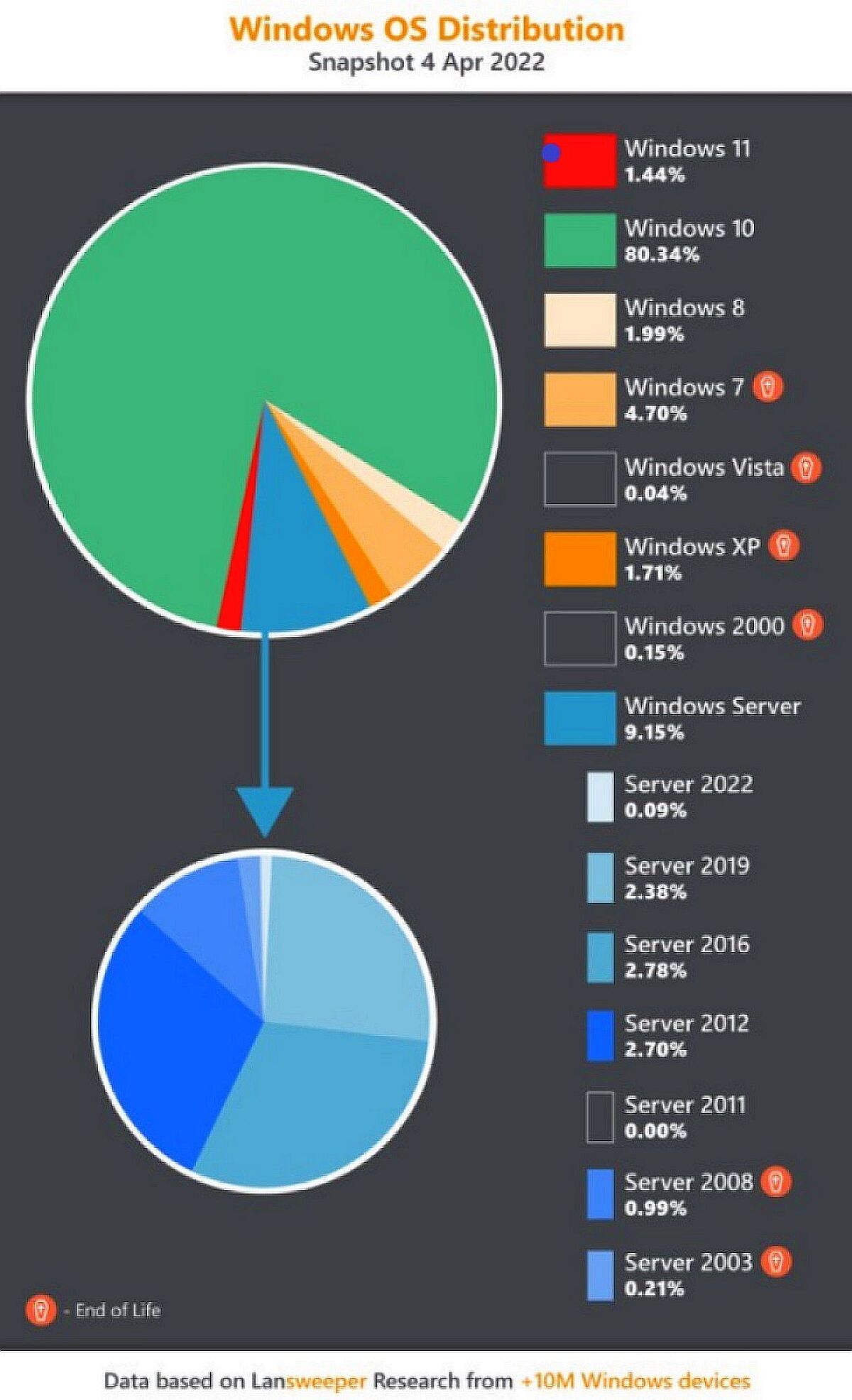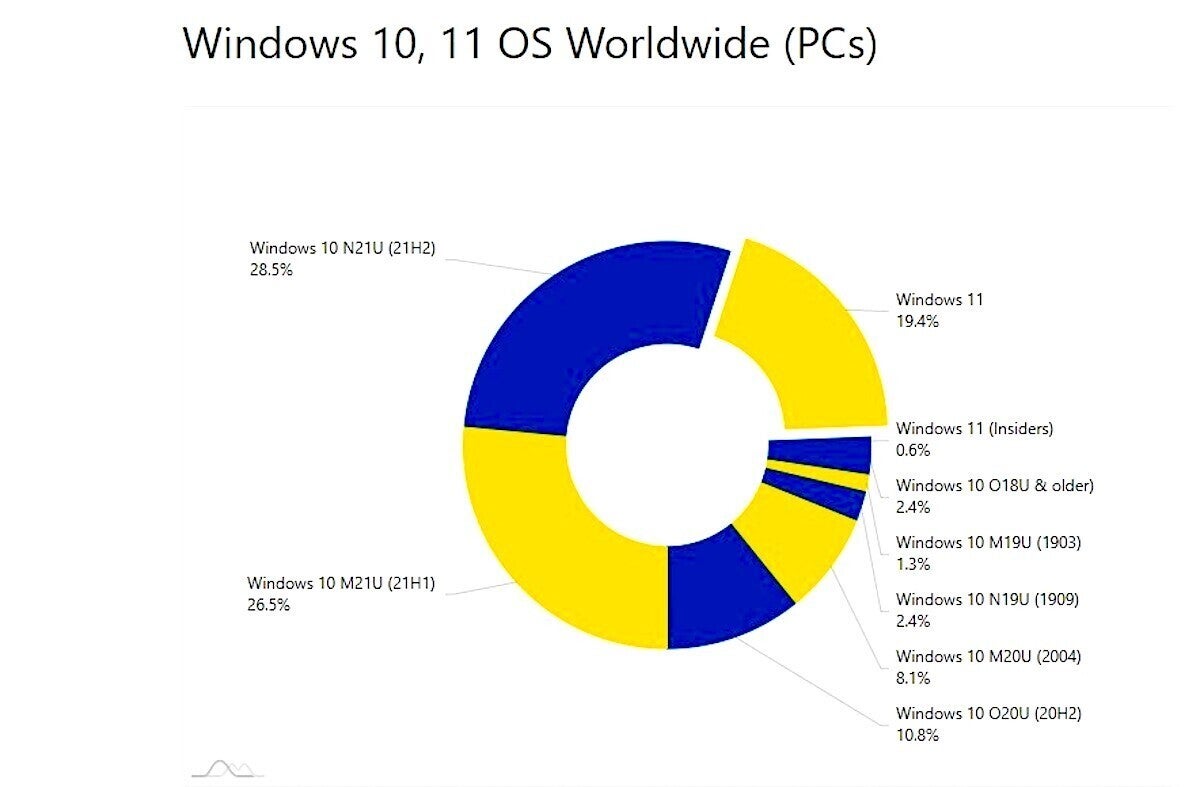































Data released today by IT asset management platform provider Lansweeper indicates that upgrades to Windows 11 have almost tripled over the past three months, but the overall adoption rate remains miniscule.
The survey of more than 10 million Microsoft devices by Lansweeper's PC management software showed 1.44% now run Windows 11, an increase from the 0.52% of PCs that ran the OS in January.
"Overall adoption remains slow, almost six months since the initial launch of Windows 11 to the general public, as previous Lansweeper research revealed that 55% of devices scanned are not capable of being upgraded to Windows 11," Lansweeper said.
While the majority of Microsoft devices scanned by Lansweeper's software passed the RAM test (91%), only about half of the workstation TPMs (Trusted Platform Modules) tested met the requirements - 19% failed and 28% were not TPM compatible or did not have it enabled, Lansweeper's monitoring showed. (Find out how to use the Windows 11 requirements checker.)
"For virtual machine workstations, the forecast is less optimistic," Lansweeper said. "While the CPU compatibility is slightly higher at 44.9%, our research shows that only 66.4% has enough RAM. For TPM the news is grim, only 0.23% of all virtual workstations have TPM 2.0 enabled. This isn't completely a surprise, TPM has never been required for Windows and while TPM passthrough (vTPM) exists in order to give virtual machines a TPM, it is rarely used. ...Most VM workstations will need to be modified to get a vTPM before they can upgrade to Windows 11.
"TPMs on physical servers only passed the test 1.49% of the time, which means about 98% would fail to upgrade if Microsoft creates a server operating system with similar requirements in the future. For virtual servers, again there are almost no TPM-enabled servers."
Lansweeper's data contrasts sharply with that of computer-monitoring software provider AdDuplex, whose latest data shows an adoption rate of 19.4%. AdDuplex's research did, however, show Windows 11 growth had stagnated in last month; it only saw a 0.1% market share increase over other Windows editions.
Alan Mendelevich, CEO of AdDuplex, said the disparity in adoption rates likely primarily comes from the fact that Lansweeper's data comes from enterprise user PCs while AdDuplex's comes primarily from consumer systems.
"I would agree that neither is super accurate, and I'm not a market analyst, but less than 1.5%... sounds unrealistic even if you take just the new Windows 11 PCs sold," Mendelevich said. "Anecdotally, all of the eligible PCs I've seen already got an opportunity to upgrade. So, even if less than half of the eligible PCs took the upgrade, it would bring the install base pretty close to our number."
Jack Gold, principal analyst at J. Gold Associates, said AdDuplex's Windows 11 adoption numbers are too high, and Lansweeper's assertion that 55% of machines can't run Windows 11 is likely too low.
"I honestly doubt that Windows 11 is running on 19% of all machines in use today, since Windows 10 is only running on about 75% or so of machines in use, depending on whose numbers you believe," Gold said. "That means that at 19%, about 25% of Windows 10 machines could be updated to Win11. I find it hard to believe that 25% of all Win10 machines out there are even compatible with Win11, given that many PCs in use are three-to-five years old or even older (probably at least 40%)."
In evaluating the data from both AdDuplex and Lansweeper, it's important to understand how the companies came up with their respective numbers, whether through a web browser interacting with certain web sites (a self-selected group of users) or through a voluntary user running the company's software (again, a self-selecting subgroup), Gold said.
"Without knowing exactly how they are obtaining their numbers, it's pretty hard to evaluate how accurate they may be. But I'd certainly lean towards a lower number than a higher one," he said.
It's likely that any machine more than a couple of years old will not be compatible with (and therefore not upgradable to) Windows 11. And PCs are even more unlikely to be compliant if they're older, lower-end machines, Gold said.
 Lansweeper
Lansweeper In December, AdDuplex's data showed Windows 11 uptake had reached nearly 9%; that number, again, contrasted sharply with figures released by Lansweeper; at that time, it showed the new platform with a less than 1% adoption rate.
Microsoft has pushed to get users to upgrade to Windows 11, but the overwhelming majority have chosen to remain on Windows 10.
Roel Decneut, chief strategy officer at Lansweeper, said unlike previous Windows releases, Windows 11 is simply an adjusted Windows 10 version, and the core differences between the two is minimal. "This is likely the main reason why businesses are against upgrading to a new, and almost unproven, version rather than staying with what they know with Windows 10," Decneut said.
Steve Kleynhans, a vice president of research at Gartner, agreed commercial customers are not really diving into the new OS. And they're not expected to do so until 2023.
Still, Kleynhans said it's "a bit" early to draw any conclusions about Windows 11's success. "While technically the OS update is six months old, a very large percentage of machines weren't being offered the update until just a couple of months ago," he said in an earlier interview. "The current [install rate] is likely just normal market evolution during the early stages of any new OS version and not a sign of anything really problematic."
 AdDuplex
AdDuplex Data from AdDuplex indicates Windows 11 uptake has slowed.
Lansweeper's updated survey results did show that the number of machines running "end of life" OSes (i.e., platforms no longer supported by Microsoft) has fallen to 6.6%, compared to 9.75% in January. A significant portion of those systems are running Windows XP and Windows 7 - software Microsoft stopped supporting back in 2014 and 2020, respectively.
"Although the rate of adoption is increasing bit by bit, it's obvious that Windows 11 upgrades aren't going as fast as Microsoft had hoped, especially within the business environment. Many organizations have been put off from having to buy new machines that meet these [hardware] conditions, while others are simply happy with the current existence of Windows 10, which continues to be supported until 2025," Decneut said.
Because of the minimal differences between Windows 10 and 11, the slow uptake of the latter is likely to continue unless businesses GET a compelling reason to upgrade, Decnuet explained.
"For those looking to adopt Windows 11, the first step is to assess which of their existing devices are capable of upgrading," he said. "It's the reason why IT asset management is so important for organizations, capable of running in-depth device audits that can tell IT teams the hardware specs of machines so they can weigh up how many devices are capable of upgrading and the potential cost of such a move."
 Tags chauds:
Microsoft Microsoft
Sous Windows 11
Tags chauds:
Microsoft Microsoft
Sous Windows 11